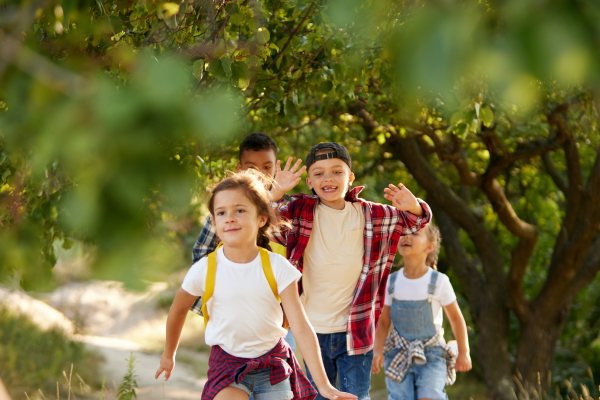
When active pupils means happy pupils

The 2024 annual theme for eTwinning is wellbeing at school. In this article, we take a closer look at some exemplary activities that teachers can use to improve the physical wellbeing of their pupils through sport, cooking classes, meditation or outdoor activities.
Tallinna Lasteaed Pääsusilm, a kindergarten school in Estonia, keeps kitchen supplies in the classrooms, and teaches children to make nutritious meals and eat healthily from an early age. Teachers also organise Olympic-style games and a sports week with daily outdoor exercises.
Volksschule Waltendorf Primary School in Graz in Austria participated in the Erasmus+ project ‘Happy Children’ to promote physical activity. It incorporates an additional 45 minutes of exercise into children’s daily routines, integrating movement-based learning into a variety of school subjects.
At the 13th Helioupolis Primary School in Athens, Greece, teachers organise outdoor classes in the nearby forest. In ‘Wellbeing through STREAM’, one of their eTwinning projects, they focused on traditional Greek dances and shared their experience with pupils from Spain, Slovakia, France and Croatia.
Teachers at Agrupamento de Escolas de Batalha in Portugal use projects and team-building activities to keep pupils moving, using simple exercises like stretching and yoga to break up long periods of sitting.
Mindfulness and relaxation strategies can also contribute to pupils’ physical wellbeing. The Here & now with art and mindfulness at school project focuses on activities that improve concentration, teaching children to focus on their breathing and bodies. For instance, in the exercise ‘Let’s feel the breath’ pupils place their palm and fingers in front of their nose to feel the breath on their skin, focusing solely on their bodies and the present moment.
At CIPFP Ciutat de l’Aprenent in Valencia, activities focus on mindfulness, healthy eating and exercise, and the school organises fun events like their annual labyrinth outing, during which they biked through scenic areas in 2023, and this year they plan a walk along the river park.
Similarly, Gymnázium P. J. Šafárika in Slovakia collaborates with community organisations, including sports clubs and fitness centres. Step challenges and creative contests encourage pupils to stay active while reducing stress through relaxation activities.
There are even more creative ways eTwinning can integrate physical wellbeing in schools. The runner-up for the 2024 European prizes – Kids save lives #skillslabs – teaches pupils essential first aid skills, such as cardiopulmonary resuscitation or CPR (an emergency treatment performed when someone’s heart stops beating) and other lifesaving techniques.
So while eTwinning integrates technology, it is clear that it is crucial to balance screen time with other activities such as sports, cooking and meditation. Learn more about the importance of physical wellbeing in the upcoming eTwinning book!
Additional information
-
Education type:Early Childhood Education and CareSchool EducationVocational Education and Training
-
Target audience:TeacherStudent TeacherHead Teacher / PrincipalTeacher Educator
-
Target audience ISCED:Early childhood education (ISCED 0)Primary education (ISCED 1)Lower secondary education (ISCED 2)Upper secondary education (ISCED 3)Post-secondary non-tertiary education (ISCED 4)
